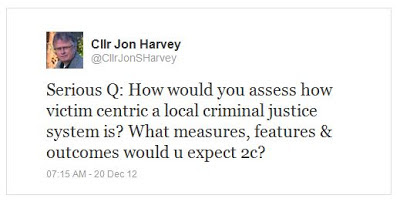I had no responses. I have just posted it again and at the time of writing, one other tweeter has got back to me. I will post an analysis of what other responses I get later on.
Meanwhile, I have been doing some research:
There is the The Code of Practice for Victims of Crime (produced by the Office for Criminal Justice Reform in 2005). There is this web guide to reporting crimes and getting compensation with links to other helpful sites (produced by DirectGov). There is also this Victims Charter and guide to the criminal justice system from the Republic of Ireland (produced by their Victims of Crime Office). There may be other documents too.
There are also the Five Promises to Victims and Witnesses that Victim Support has asked all elected PCC's to sign. So far most, but not all, PCCs have signed up to these promises.
All PCCs have had to swear an oath of office which I have reprinted below, with added highlight:
I [name] do hereby declare that I accept the office of Police and Crime Commissioner for [police area]. In making this declaration, I solemnly and sincerely promise that during my term of office:What would help me, and perhaps others too, is for there to be an easy way to compare one PCC / CJS area with another. Perhaps if we had something like this...?
- I will serve all the people of [police area] in the office of Police and Crime Commissioner.
- I will act with integrity and diligence in my role and, to the best of my ability, will execute the duties of my office to ensure that the police are able to cut crime and protect the public.
- I will give a voice to the public, especially victims of crime, and work with other services to ensure the safety of the community and effective criminal justice.
- I will take all steps within my power to ensure transparency of my decisions, so that I may be properly held to account by the public.
- I will not interfere with the operational independence of police officers.
This needs work naturally, not least that I am sure there are not the correct set of parameters and of course all the boxes are empty. If you would like to work with me on refining this tool, I have uploaded a copy to my Google Drive with the link to access it here. (You will be able to read it more easily there.) And if you want to co-draft this, then please email me and we can start a dialogue.
So back to my question:
What does a victim centric CJS look like?


A victim centric CJS needs to start from the needs of victims of crime and from internationally agreed standards.
ReplyDeleteIn my book Rights for Victims of Crime, Rebalancing Justice, I provide you with a systematic analysis of the needs of victims of crime, a chapter that gives an overview of international standards (true prior to the EU directive), a chapter based in part on the IACP proposals to enhance law enforcement response to victims, chapters on services and reparation, and importantly a chapter on the role of the victim in the criminal justice process. The book also provides a model law that integrates all this into one place.
I hope you will share this with your PCC´s and many more.
And if people want to order your book, Irwin, they can do it from here, I understand: http://www.wallerirvin.org/.
DeleteWhat would add to the framework I have given above. I would value your contribution to its completion...